|
Thank you
stamp donors!
Thank
you to everyone listed below who sent us stamps (and donations
towards stamps) to assist us in spreading the word to our CT
shelters.
Abby, Debbie, Joan, Melinda, Barb, Donna, Kathleen, Michelle, Cathy,
Irene, Lew, Paula, Damiana, Jamie, Mary & Shirley!
Get to Know
Your Predators:
Peregrine
Falcon/Duck Hawk
The
Duck Hawk weighs in between 1 and 2 pounds. This falcon is a brutal
bird killer, making prey of birds as large as Mallards.
The
duck hawk can easily overtake a fast flying bird. If its prey is not
too heavy, it will actually seize it mid-air and fly away with it.
They strike their prey with such power that it either kills them on
impact or sends them tumbling to the ground.
Recommended
Reading*
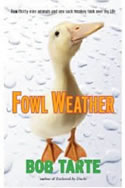
|
Ordering
information
|
Fowl Weather
By
Bob Tarte
April, 2007
Tarte serves up
another helping of his always interesting life surrounded by
animals. In Bob Tarte's home, pandemonium is the order of the day,
and animals literally rule the roost -- thirty-nine of them at last
count. Whether it's the knot-tying African grey parrot, or the
overweight cat who's trained Bob to hold her water bowl just above
the floor, or the nightmarish duck who challenges him to a shoving
match, this menagerie, along with his endlessly optimistic wife,
Linda, provides daily lessons on the chaos inherent in our lives.
But not until
this modern-day Noah's Ark hits stormy weather -- and Bob's world
spins out of control -- does he realize that this exuberant gaggle
of animals provides his spiritual anchor. It is their alien
presence, their sense of humor, and their impulsive behavior that
both drive Bob crazy and paradoxically return him to sanity.
|
* |
For
our full recommended reading list, click
here. If you order from
Amazon by way of our website, Majestic receives a
portion of the proceeds!
|
Reader Poll
#28
Question:
Now that Wolfgang Puck has gone cruelty-free and banned
foie gras, will you purchase his products and eat at his
restaurants?
Results of Reader Poll #27
Question 1:
Are you going to read Bob Tarte's new book Fowl Weather?
|
Yes |
70% |
|
No |
10% |
|
Undecided |
20% |
Question 2:
Have you read Bob Tarte's first book Enslaved by Ducks?
Contact Us
Majestic Waterfowl
Sanctuary
17 Barker Road
Lebanon, CT 06249
directorATmajesticwaterfowl.org
Our Newsletter
The Majestic Monthly is published 12 times per year.
Previous issues are available in our
Archives.
|
What's that
"Thing?" This
question has come up since our inception and it continues to
make its rounds. The corkscrew shaped body organ dangling from
your drake is not his entrails falling out, but rather, quite
normally, his penis.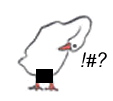
It is not unusual to see this
appendage outside of your drake’s body (especially after mating
rituals) unless it does not return all the way back inside again
soon after making its appearance. If you see the tip of your
drake’s penis continually exposed over the course of a few hours
or more, something is most likely wrong.
An exposed penis (called "penis
paralysis," "phallus prostration," or "protracted penis") most
frequently occurs when a drake is not given ample access to
clean swimming water. If one of your flock members exhibits this
trait, serious considerations to the availability of swimming
water in his living environment should be taken -- now and going
forward. If you are certain that lack of water is not the issue,
over exertion during the mating season, infection, genetic tendency and old
age can also be factors.
In any case, you will want to
make it immediately possible for your drake to have ready access
to clean swimming water -- a kiddie pool is perfectly
acceptable. You will also want to give him a break from any
courting hens in case over exertion is part of the problem. You
may want to separate your drake from all of your ducks to
prevent any pecking, especially if it appears to be attracting
unwanted attention.
The more time he spends
relaxing on clean water, the more likely the situation will
remedy itself quickly. Some families have had additional success
by adding a small swimming basin to their drake’s nighttime
barn/shed as well, to promote evening swimming -- at least until
the condition remedies itself. Take caution during colder months
that small water sources cannot freeze up while your duck is
sitting in them.
During this time, it is vital
that swimming water and grounds are kept exceptionally clean to
avoid an infection of the penis. Change out water frequently and
hose down yards a couple of times a day in addition to laying
down fresh bedding frequently.
Be wary of misinformation and
avoid "home remedies" that include tactics like tying-off
the penis. Not only is this information unreliable, but it is
also dangerous, cruel and painful for the bird. Seek out
qualified veterinary assistance!
Vets have varying opinions on
this matter, but a round of antibiotics at a minimum is required (Baytril 22 mg, once daily for
at least 7 days) to rule out any possible infection. We highly recommend
this general antibiotic treatment since it is not harmful to the
duck and can help your drake toward a quick recovery.
If your drake is exhibiting a
visible infection (redness, irritation, necrotic tissue, etc.) he should be
brought to the vet for immediate examination and treatment. In most cases, if attended to
immediately, the penis will not become infected and it will
retreat back into the drake’s body within a couple of days. It
is not unheard of, however, for the penis to remain exposed for
months before returning inside the body. Some drakes exhibit the
trait for the remainder of their life. In this case, it is
possible that the tip of the penis might begin to dry up and fall off,
leaving the remaining portion functional. If this begins to
happen, bring your feathered friend to the vet for follow up
visits to monitor progress.
Vet’s can surgically
remove the tip of the penis, but this is not recommended unless there is an
infection that requires medical intervention. An exposed penis
is very rarely fatal when properly attended to.
Elijah: Livin'
Large at Majestic
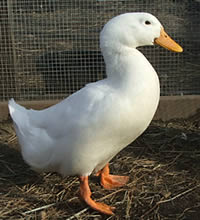 Elijah
asked if we would run a little article in our newsletter this
month. He said he wished to explicitly thank all of his
supporters for their kindness and generosity, and he wanted to
let you know how he’s doing these days. What Elijah wants,
Elijah gets! Elijah
asked if we would run a little article in our newsletter this
month. He said he wished to explicitly thank all of his
supporters for their kindness and generosity, and he wanted to
let you know how he’s doing these days. What Elijah wants,
Elijah gets!
This big fluff-o-nutter is enjoying his
retirement at Majestic to the fullest! At night, Elijah shares a
large cozy kennel with his true love, a Silver Appleyard hen,
named Jezebel. She is a real beauty, and Elijah’s favorite girl.
During walks around the yard Elijah never walks far without
Jezebel. He is a true "gentleduck" and stops and waits for his
lady to catch up. It is exceptionally cute to watch him stop in
doorways to allow her to enter first -- so romantic!
Every morning, we walk Elijah and
Jezebel to the Courtyard along with a handful of other hens.
Elijah and his ladies spend every other day on our large
Courtyard pond. On days when it is not his turn for a swim, he
still stays in the Courtyard, but he spends his day in a large
pen that neighbors the water. His injured legs have grown very
strong from all his swimming, and he gets around very well. In
order to avoid over-exerting himself too much, he periodically,
and quite comically, plops down to the ground and watches his
ladies meander around him.
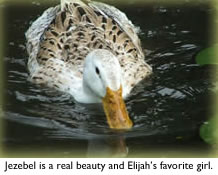
Elijah is a happy guy, always smiling
and the first to quack happily when he spots us walking down the
hillside towards the enclosures -- his hoarse quack easily
distinguishable from all of the others.
Elijah sustained a raccoon bite very
close to his left eye before coming to us. Because of this, his
eyelids no longer seal perfectly on that side (nothing
noticeable, mind you… he is still very handsome). This means
“Squints” needs continual assistance in fending off tear duct
infections. Although he receives treatment to his left eye on a
near daily basis, we’re going to venture and say he doesn’t mind
it too much because each time we administer his medicine, he
gives us a big, feathery hug.
On behalf of our dear Elijah, we want to
thank all of his dedicated and caring Sponsors who help make his
life here at Majestic so wonderful. A special thanks to all of
our other Sponsors as well, who help take care of Elijah’s good
friends -- the many other ducks and geese residing at our
sanctuary.
And speaking of Sponsors . . . We have
added a new gift to our Sponsorship Package! Visit our
Sponsorship Page for more
information on how to sponsor a Majestic duck or goose.
Helpful Crows
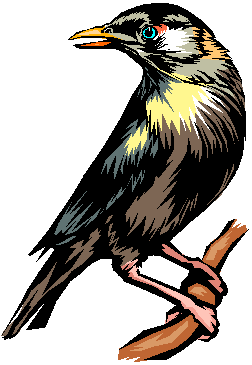 Crows
can be a great asset in keeping hawks and other flying predators
clear of your duck pen. Simply putting out some leftover duck
food or cracked corn in the morning for your crows will usually
draw in a family (be sure to pick up any leftovers at night to
avoid drawing in nocturnal predators). Crows
can be a great asset in keeping hawks and other flying predators
clear of your duck pen. Simply putting out some leftover duck
food or cracked corn in the morning for your crows will usually
draw in a family (be sure to pick up any leftovers at night to
avoid drawing in nocturnal predators).
A crow family is a
tight-knit group and vigilant when it comes to protecting their
young and their territory. They are relentless and will drive
away many flying predators all for the price of some corn. Crows
will also sound alarm calls that can assist you in knowing when
there is trouble about.
|

